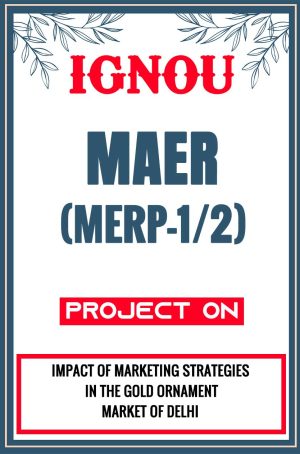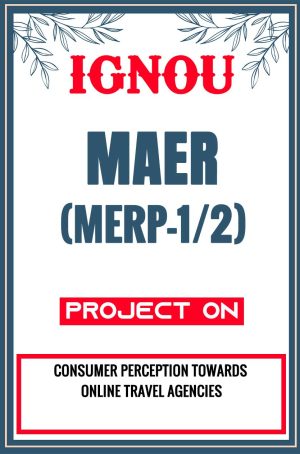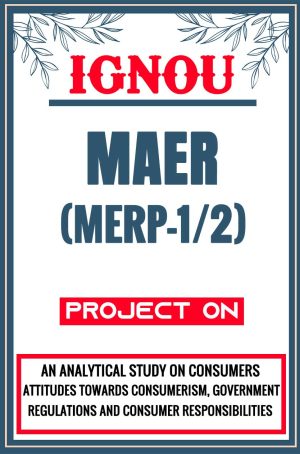Buy IGNOU MAER Project for MERP 001/002
The IGNOU MAER (Master of Arts in Entrepreneurship) Project for MERP 001/002 is a key component of the IGNOU MAER program, focusing on the practical application of entrepreneurial concepts learned throughout the course. MERP 001 and MERP 002 are project work components where students are required to undertake a research-based project or create a business plan to demonstrate their understanding of entrepreneurship in real-world contexts.
Whatsapp us to get the Personalized (Customized) IGNOU MAER Project Report and Synopsis
Download Link for IGNOU MAER Project (MERP 001/002 PDF)
MERP 001 typically involves a research project where students identify a problem or opportunity within the entrepreneurship domain, conduct a thorough analysis, and propose solutions or strategies. This could involve market research, feasibility studies, or case studies related to business ventures.
MERP 002, on the other hand, usually requires students to develop a detailed business plan for a new venture. This includes conducting market analysis, defining business models, financial planning, and outlining operational strategies.
What is the project duration for IGNOU MAER Project?
The project duration for the IGNOU MAER (Master of Arts in Entrepreneurship) program typically spans across one academic year. This period includes the time allocated for both components, MERP 001 and MERP 002.
Students are expected to select their project topic, conduct research, gather data, and compile their findings or develop a business plan within this timeframe. The specific deadlines for submission are usually provided by IGNOU at the beginning of the academic year.
Students should confirm the exact duration and deadlines as they may vary depending on the specific academic calendar for their enrollment year.
How is the IGNOU MAER Project evaluated?
The MAER (Master of Arts in Entrepreneurship) project at IGNOU is evaluated based on a combination of several factors that assess both the content and the student’s ability to apply theoretical knowledge in a practical context. The evaluation typically includes the following components:
- Project Report/Business Plan: The quality of the written report or business plan is a significant aspect of the evaluation. This includes the clarity of objectives, depth of research or market analysis, structure, and organization of the report, as well as the relevance and feasibility of the proposed solutions or business model.
- Practical Application: The evaluation also considers how well the student has applied entrepreneurial concepts and theories to real-world situations. This involves assessing the practicality, innovation, and strategic thinking demonstrated in the project.
- Presentation/Viva Voce: After the submission of the project report or business plan, students may be required to present their work before a panel. This presentation, often followed by a viva voce (oral examination), allows the evaluators to assess the student’s understanding of the project, their ability to defend their work, and their communication skills.
- Originality and Research Methodology: The originality of the project and the robustness of the research methodology used are also crucial factors. The project should reflect independent thought, critical analysis, and adherence to academic standard.
Samples of IGNOU MAER Project topics for MERP 001/002
- Marketing Of Home Delivery System In Super Market With Special Reference To Problems And Prospects
- Consumers Attitudes Towards Consumerism, Government Regulations And Consumer Responsibilities
- Customer Preferences And Selling Practices Of Life Insurance Products
- Consumer Perception Towards Online Travel Agencies
How do you write a project synopsis for IGNOU MAER Project?
Writing a project synopsis for the MAER (Master of Arts in Entrepreneurship) requires clarity, precision, and a focus on the key aspects of your project. Here’s a step-by-step guide to help you craft a strong synopsis:
1. Title of the Project
- Provide a clear, concise, and descriptive title that reflects the essence of your project.
2. Introduction
- Begin with a brief introduction to your project. Explain the significance of the topic and why it is relevant to entrepreneurship. Provide some background information and context to set the stage for your project.
3. Objectives of the Project
- List the primary objectives of your project. These should be specific, measurable, achievable, relevant, and time-bound (SMART). Clearly state what you aim to achieve through your research or business plan.
4. Scope of the Project
- Define the scope of your project, including the key areas of focus, the target market or audience, and any limitations or constraints. This section should clarify the boundaries of your MAER project.
5. Research Methodology
- Describe the research methodology you plan to use. This could include qualitative or quantitative research, data collection methods (surveys, interviews, etc.), and analysis techniques. For a business plan, outline the approach to market analysis, financial projections, and operational planning.
6. Expected Outcomes
- Discuss the expected outcomes of your project. What are the anticipated findings or results? How will these outcomes contribute to the field of entrepreneurship or address the problem you’ve identified?
7. Timeline
- Provide a timeline or a Gantt chart outlining the various stages of your project, including research, data collection, analysis, writing, and submission. This helps in showing that you have a structured approach to completing the project within the allotted time.
8. References
- Include a brief list of key references or sources you intend to consult for your MAER project. This shows that you’ve already done some preliminary research and have identified relevant literature.
9. Conclusion
- Conclude with a summary of your project’s importance, how it aligns with your career goals in entrepreneurship, and the potential impact of your findings or business plan.
How do you collect data for your IGNOU MAER Project?
Collecting data for your MAER (Master of Arts in Entrepreneurship) project involves a systematic approach to gathering information that will help you answer your research questions or validate your business plan. Here’s how you can do it:
Define Your Research Objectives
Clearly outline the specific information you need to collect. This depends on your project’s objectives and whether you are conducting research or developing a business plan.
Choose Your Data Collection Methods
- Primary Data Collection: This involves gathering new data that has not been collected before.
- Surveys/Questionnaires: Design surveys to gather quantitative data from a large audience. Use tools like Google Forms or SurveyMonkey to distribute them.
- Interviews: Conduct in-depth interviews with entrepreneurs, industry experts, or potential customers. This is ideal for collecting qualitative data.
- Focus Groups: Organize focus groups to get diverse perspectives on a specific topic related to your project.
- Observation: Observe consumer behavior, market trends, or operational processes relevant to your study.
- Secondary Data Collection: This involves using existing data that has already been collected.
- Literature Review: Access academic journals, books, and reports to gather data on existing research in your area of study.
- Industry Reports: Use industry reports, market analysis, and financial statements to gather data for your business plan.
- Government and Institutional Data: Utilize data from government publications, census data, or reports from trade associations.
- Online Databases: Use online databases like JSTOR, Google Scholar, and others to find relevant studies and data.
Develop Data Collection Instruments
- If you’re using primary data collection methods, create tools such as surveys, interview guides, or observation checklists. Ensure they are aligned with your research objectives.
Sampling
- Decide on the sample size and sampling method for your data collection. This could be random sampling, stratified sampling, or purposive sampling, depending on your project requirements.
Pilot Testing
- Before collecting data on a large scale, conduct a pilot test to ensure that your data collection instruments are effective and to identify any potential issues.
Collect the Data
- Implement your data collection plan by distributing surveys, conducting interviews, or gathering secondary data. Ensure to keep track of the data collection process meticulously.
Data Management
- Organize and store your data systematically, whether it’s digital or physical. Use tools like Excel, SPSS, or NVivo for quantitative and qualitative data analysis.
Ethical Considerations
- Ensure that your data collection adheres to ethical standards, including obtaining informed consent from participants, ensuring confidentiality, and accurately reporting data.
Analyze the Data
- Once collected, analyze the data using appropriate statistical or thematic analysis methods to draw conclusions that support your project’s objectives.
What is the role of the project guide in the IGNOU MAER Project?
The role of the project guide in the MAER (Master of Arts in Entrepreneurship) project is crucial to the successful completion of the project. The guide acts as a mentor, advisor, and evaluator throughout the entire process, helping the student navigate the complexities of the project. Here are the key responsibilities of the project guide:
1. Guidance on Topic Selection
The project guide helps the student in selecting a relevant and feasible project topic that aligns with the objectives of the MAER program and the student’s interests.
2. Proposal and Synopsis Review
The guide reviews the project proposal and synopsis, providing feedback to ensure that the research objectives, methodology, and scope are well-defined and achievable.
3. Research Methodology Assistance
The guide advises on appropriate research methodologies, data collection techniques, and tools that will best suit the project. They ensure that the student understands how to apply these methods effectively.
4. Regular Monitoring and Feedback
The project guide monitors the student’s progress regularly, offering constructive feedback at various stages of the project. They help the student stay on track with the timeline and ensure that the work meets academic standards.
5. Support in Data Analysis
If the student encounters challenges in data analysis, the guide provides support in choosing the right analytical methods and interpreting the results accurately.
6. Draft Review
The guide reviews the drafts of the project report or business plan, suggesting improvements in structure, content, and presentation. They help the student refine their arguments and ensure clarity and coherence in the writing.
7. Ethical Oversight
The project guide ensures that the student adheres to ethical standards throughout the research process, including obtaining necessary approvals and maintaining confidentiality.
8. Preparation for Viva Voce
The guide helps the student prepare for the viva voce (oral examination) by conducting mock presentations and offering tips on how to effectively communicate and defend their work.
9. Final Evaluation and Recommendations
The guide plays a role in the final evaluation of the project. They assess whether the student has met the objectives and provide a recommendation or grade based on the quality of the work.
10. Support and Encouragement
Throughout the project, the guide provides moral support and encouragements, helping the student overcome any obstacles and maintain motivation.
How do you submit the IGNOU MAER Project report?
Submitting your MAER (Master of Arts in Entrepreneurship) project report is a critical final step in the process. The submission process typically involves several steps, which may vary slightly depending on the guidelines provided by IGNOU or your study center. Here’s a general guide on how to submit your MAER project report:
Prepare the Final Report
- Ensure that your project report is complete, thoroughly proofread, and formatted according to IGNOU’s guidelines. This includes having a title page, acknowledgments, table of contents, main body, references, and any appendices.
- Ensure that all required documents, such as your project proposal, approval letter, and any other relevant forms, are included.
Get Approval from Your Project Guide
- Before submitting, have your project guide review the final report. Obtain their signature on the approval form or the project report itself, as required. The guide’s approval is often necessary for your report to be considered for evaluation.
Prepare the Submission Copies
Typically, you will need to prepare multiple copies of your project report:
- One hard copy for submission to the regional center or study center.
- One hard copy for your guide.
- One personal copy for your own records.
Additionally, you may need to submit a soft copy (PDF format) on a CD, USB drive, or through an online portal, depending on the specific instructions from IGNOU.
Fill Out Required Forms
- Complete any required forms provided by IGNOU, such as the project submission form, which may include details about your project, your guide’s information, and your enrollment details.
Submit at the Regional or Study Center
- Submit the required hard copies of your project report along with the completed forms at your designated IGNOU regional center or study center. Be sure to check the submission deadlines and working hours of the center.
- If an online submission is required, upload the soft copy of your report to the specified portal or send it via email as instructed.
Obtain an Acknowledgment
- After submission, obtain an acknowledgment receipt from the regional or study center. This receipt serves as proof of your submission and may be needed for future reference.
Follow Up
- After submission, periodically check the status of your project evaluation through IGNOU’s student portal or by contacting your study center. The evaluation process may take some time, and following up ensures that your project is being processed.
Prepare for Viva Voce
- Once your project is submitted, prepare for the viva voce (oral examination) that will be scheduled by IGNOU. This is an essential part of the evaluation process, where you will defend your MAER project.
Ready to get your IGNOU MAER Project Report and Synopsis Sample PDF for MERP 001/002?
- Call us or WhatsApp us at: 9958947060, 9354637830
- Visit: SHRICHAKRADHAR.COM
-
Sale!

-
Sale!

IGNOU MAER Project (MERP-1/2) Synopsis/Proposal & Project Report/Dissertation in Hard-Copy (Sample-4)
Original price was: ₹499.00.₹249.00Current price is: ₹249.00. -
Sale!

IGNOU MAER Project (MERP-1/2) Synopsis/Proposal & Project Report/Dissertation in Hard-Copy (Sample-3)
Original price was: ₹449.00.₹249.00Current price is: ₹249.00. -
Sale!

IGNOU MAER Project (MERP-1/2) Synopsis/Proposal & Project Report/Dissertation in Hard-Copy (Sample-2)
Original price was: ₹499.00.₹249.00Current price is: ₹249.00. -
Sale!

IGNOU MAER Project (MERP-1/2) Synopsis/Proposal & Project Report/Dissertation in Hard-Copy (Sample-1)
Original price was: ₹499.00.₹249.00Current price is: ₹249.00.





